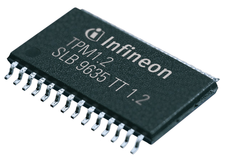Security with the Trusted Platform Module
Trusted Computing

The Trusted Platform Module on your computer's motherboard could lead to better security for your Linux system.
The security of any operating system (OS) layer depends on the security of every layer below it. If the CPU can't be trusted to execute code correctly, there's no way to run secure software on that CPU. If the bootloader has been tampered with, you cannot trust the kernel that the bootloader boots. Secure Boot allows the firmware to validate a bootloader before executing it, but if the firmware itself has been backdoored, you have no way to verify that Secure Boot functioned correctly.
This problem seems insurmountable: You can only trust the OS to verify that the firmware is untampered with if the firmware itself has not been tampered with. How can you verify the state of a system without having to trust it first?
The answer lies in a set of technologies collectively referred to as Trusted Computing. A consortium of companies called the Trusted Computing Group [1] maintains the specifications related to Trusted Computing. At the heart of the Trusted Computing environment is a small hardware component called a Trusted Platform Module (TPM). The TPM is a chip connected by bus to the system motherboard, and sometimes it can be retrofitted as a module (Figure 1). TPMs are not fast or powerful – almost anything that can be done on a TPM can be done much faster on the CPU. Neither can the TPM see what's happening on the rest of the system; TPMs know only what the rest of the computer chooses to tell them.
[...]
Buy this article as PDF
(incl. VAT)
Buy Linux Magazine
Subscribe to our Linux Newsletters
Find Linux and Open Source Jobs
Subscribe to our ADMIN Newsletters
Support Our Work
Linux Magazine content is made possible with support from readers like you. Please consider contributing when you’ve found an article to be beneficial.

News
-
New Linux Botnet Discovered
The SSHStalker botnet uses IRC C2 to control systems via legacy Linux kernel exploits.
-
The Next Linux Kernel Turns 7.0
Linus Torvalds has announced that after Linux kernel 6.19, we'll finally reach the 7.0 iteration stage.
-
Linux From Scratch Drops SysVinit Support
LFS will no longer support SysVinit.
-
LibreOffice 26.2 Now Available
With new features, improvements, and bug fixes, LibreOffice 26.2 delivers a modern, polished office suite without compromise.
-
Linux Kernel Project Releases Project Continuity Document
What happens to Linux when there's no Linus? It's a question many of us have asked over the years, and it seems it's also on the minds of the Linux kernel project.
-
Mecha Systems Introduces Linux Handheld
Mecha Systems has revealed its Mecha Comet, a new handheld computer powered by – you guessed it – Linux.
-
MX Linux 25.1 Features Dual Init System ISO
The latest release of MX Linux caters to lovers of two different init systems and even offers instructions on how to transition.
-
Photoshop on Linux?
A developer has patched Wine so that it'll run specific versions of Photoshop that depend on Adobe Creative Cloud.
-
Linux Mint 22.3 Now Available with New Tools
Linux Mint 22.3 has been released with a pair of new tools for system admins and some pretty cool new features.
-
New Linux Malware Targets Cloud-Based Linux Installations
VoidLink, a new Linux malware, should be of real concern because of its stealth and customization.
